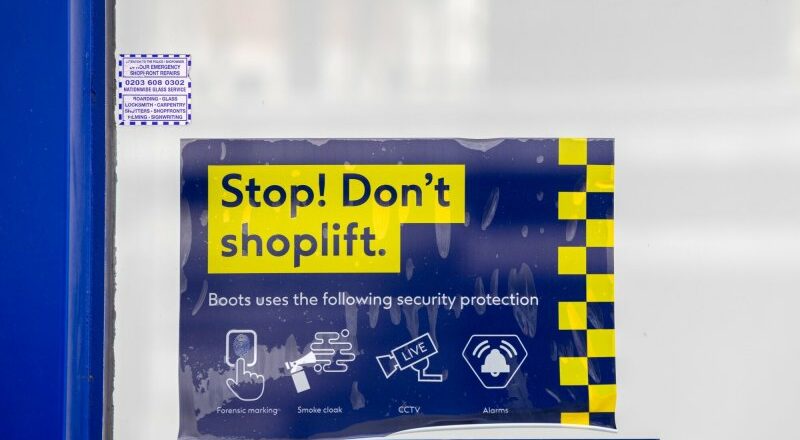Britain’s latest epidemic – shoplifting – looks set to go global
Save articles for later
Add articles to your saved list and come back to them any time.
What in the World, a free weekly newsletter from our foreign correspondents, is sent every Thursday. Below is an excerpt. Sign up to get the whole newsletter delivered to your inbox.
Greetings from Britain, a nation of shoplifters.
Rarely do I visit my local Tesco Express without seeing a security guard confront someone they suspect of being light-fingered. I’ve lost count of the number of times I’ve been on a bus going past a supermarket when a person has run out of the store with bags full of groceries, being pursued, often reluctantly, by an out-of-condition shop employee.
Security warning signs in a shop window in central LondonCredit: Bloomberg
It’s not just anecdotal, either − the British Retail Consortium says there were 8 million instances of theft from shops in the past year, costing businesses nearly £1 billion ($1.9 billion). Police recorded 365,164 shoplifting offences in the year to June − up 25 per cent on the previous 12 months.
The phenomenon is not, however, particularly recent. Thefts had dropped dramatically during the pandemic and are still not as high as 375,350 offences in 2018-19.
A security guard stands near the entrance of a shop in central London.Credit: Bloomberg
Poorer neighbourhoods have long had to put up with the smash-and-grab antics of what some might call “feral youth”, but it is now also common in London’s leafy, affluent postcodes.
More than 80 companies, including Tesco, Sainsbury’s, WH Smith, Aldi, Primark and Superdrug, have written to the UK government to demand action.
The cost-of-living crisis is being blamed, along with the rise in organised crime gangs. Popular items to pinch include laundry tablets, alcohol, baby formula, confectionery and meat, which some shops report are grabbed in bulk, to be on sold.
Police statistics don’t address shoplifters’ motives, but the increase in theft has incited debate among academics about the root causes. Poverty and surging food prices? A failure to tackle illicit drugs and homelessness? While some suggest it’s an increase in the number of organised crime networks, others believe it’s simply declining standards of behaviour.
The Association of Convenience Stores, which represents 33,500 small shops, says most shoplifters are repeat offenders, often with drug or alcohol problems.
But Archie Norman, the chairman of beloved British retail store Marks & Spencer, said this week that shoplifting was “creeping in” among the middle class because of self-checkouts.
While many people like self-checkouts for their convenience and speed, it has become clear they can prompt increasingly unethical behaviour.
Norman said shoplifting was fast becoming a global problem.
“It’s too easy to say it’s a cost-of-living problem. Some of this shoplifting is gangs. Then you get the middle class,” he said. “With the reduction of service you get in a lot of shops, a lot of people think: ‘This didn’t scan properly, or it’s very difficult to scan these things through and I shop here all the time. It’s not my fault, I’m owed it’.”
I have long hated these stupid self-service checkouts but in most supermarkets in London it’s now impossible to avoid them.
Earlier this month, Booths, a supermarket chain in the north of England, axed its self-service tills in response to customer feedback.
“We believe colleagues serving customers deliver a better customer experience and therefore we have taken the decision to remove self-checkouts in the majority of our stores,” the company said.
If only others would follow.
That great British treasure-trove of social commentary, Mumsnet, is plastered with anonymous shoplifting tales, with one woman confessing she scanned most items but threw one in without paying for it, partly down to money worries but also just for a “rush”.
As the world grapples with the implications of AI, our current shopping experiences might be a useful reminder of the unforeseen effects of the drive for efficiency.
Researchers point out that simply posting someone to greet shoppers at the door can reduce theft, but only high-end shops tend to do this. It’s clear we’re in an ever-decreasing circle of human interaction and the jury has delivered its verdict: it’s a bad thing.
Get a note directly from our foreign correspondents on what’s making headlines around the world. Sign up for the weekly What in the World newsletter here.
Most Viewed in World
From our partners
Source: Read Full Article



